Julissa Reynoso, Former U.S. Ambassador, on Confidence and Cowboy Boots
February 14, 2018 | Filed in: Woman of the Week
Now a partner at Winston & Strawn, an international law firm in New York, Julissa Reynoso is one of the youngest women to ever serve as a U.S. Ambassador, which she did in Uruguay under then-Secretary of State Hillary Clinton. Here, she talks about emigrating to the U.S. from the Dominican Republic, growing up in the Bronx, and collecting cowboy boots.
THE MOST IMPACTFUL TRANSITION of my life was moving from a small, rural village in the Dominican Republic to New York City. After that, anything is a piece of cake! When I was very young, my parents came to New York to work, and I was raised by my grandparents and extended family. When I was seven, my mother petitioned for me to come to the U.S. as an immigrant, and I moved to the Bronx in 1982. I remember the process well—getting the visa, those first moments seeing the city as a kid. I’m short as it is, and I was an extremely small child, so everything looked humongous to me. There were so many different people compared to my village, where everyone was related to each other and looked similar. It was a big shock.
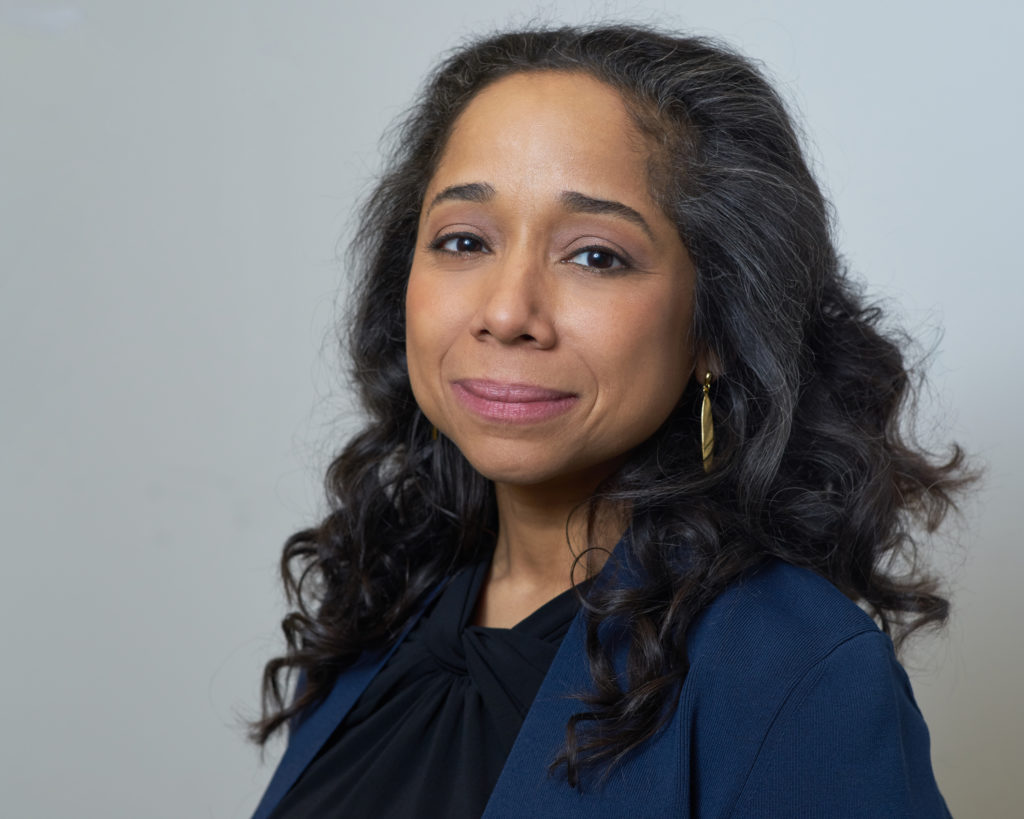
Julissa wears the Walters top in black, the Sant Ambroeus jardigan in galaxy blue, and the Telesto earrings.
I CAME TO THE U.S. without knowing how to speak English, and I couldn’t put together a sentence until I was around eight years old. I was taught that opportunities take work; there was no natural endowment. Growing up in the Bronx, I was exposed to a lot of political activity, because there were many social problems in that area in the ‘80s. I could see the difference between where I was living and what was on TV, and it gave me the feeling that something wasn’t right—a sense of social justice. I knew that I wanted to do something with a broad societal impact, but I didn’t consider law as a career option until I was in college.
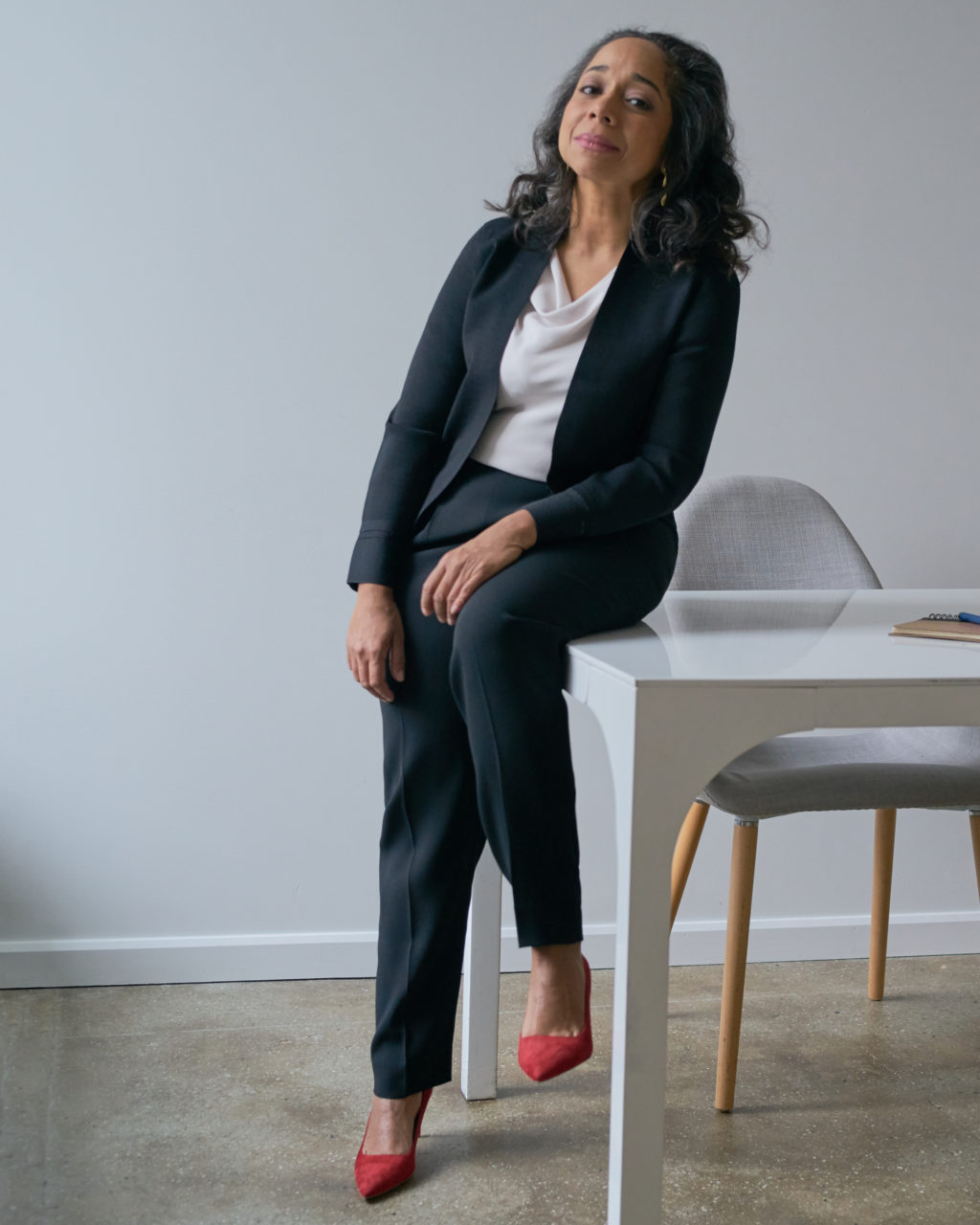
Julissa wears the Rowling top in birch, the Sant Ambroeus jardigan in black, the Howland trouser in black, the Telesto earrings, and the Vanessa pump in red.
GOING TO HARVARD WAS DIFFICULT for me in certain ways. Many of my classmates knew each other from high school, and had similar upbringings, but I didn’t know anyone. It was a struggle, and the work was hard. Ultimately, I did well, but at the beginning, I wasn’t prepared to consume the volume of information that was thrown at me. I would close my door and read, process all the information, and try to catch up. I had to learn a whole new set of norms, and how to navigate relationships that had different codes of conduct.
AS A LAWYER, I’m more confident now than I ever was before. I know how to handle complex legal questions, or at least how to get the right team together to deal with a case. But you have to constantly solve new and diverse problems. I don’t think you can ever say, “This is it. I’m a great lawyer.” But I would say I’m a good listener. I try to empathize with people, and understand what their needs are.
IN MY FIRST JOB, I had moments when I thought, “Do I want to work in a law firm for the rest of my life?” As much as I enjoyed the work, part of me still thought, “I don’t think this is what I’m supposed to do forever.” Sometimes, when you’re a good student, you get put on a certain path, and you’re not exposed to other possibilities. But the more senior you get in your career, the more people you know and the more opportunities open up.
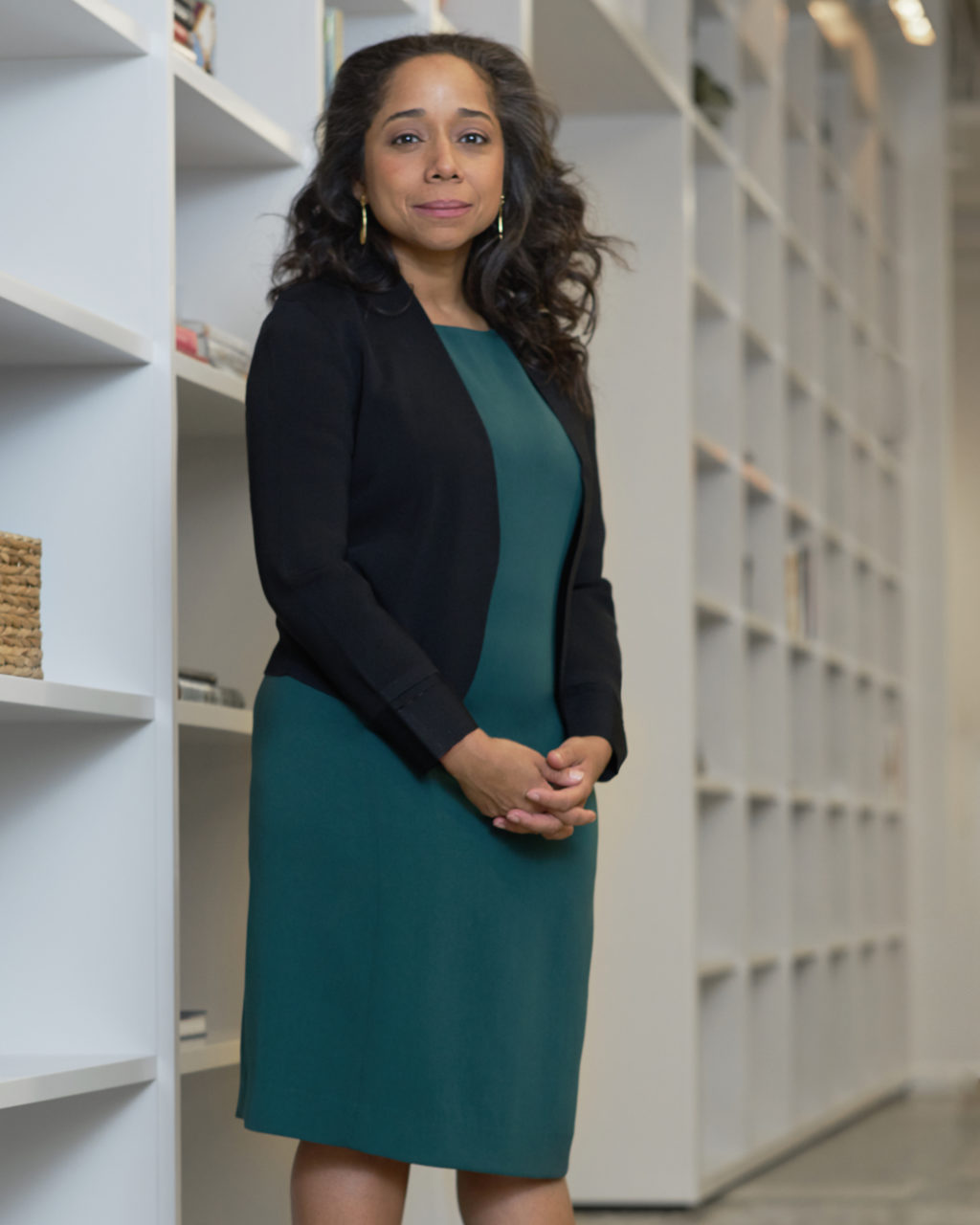
Julissa wears the Sarah dress in viridian, the Sant Ambroeus jardigan in black, and the Telesto earrings.
I’VE ALWAYS BEEN INVOLVED IN MY COMMUNITY, so I was keen to help when then-Senator Hillary Clinton ran for president in 2008. At the time, I was a junior lawyer at a firm in New York, so I just volunteered whenever I had time. It was fun, and I thought she would make a fantastic president. I was very committed to her—I even went around the country knocking on doors and fundraising. When she became Secretary of State, she invited me to work with her in the State Department. It was a transformative experience. At the beginning, I felt overwhelmed and anxious, but I still had the ability, honed in school, to put my head down and study and do the work. I made mistakes, of course. But I also had to be patient with myself.
AT THE STATE DEPARTMENT, I was exposed to all types of issues, from the earthquake in Haiti to the political crisis in Honduras and corruption issues all over Latin America. But I eventually reached a point where I asked myself, “Okay, what’s my next step for my professional development?” I thought about coming back to practice law in New York, but Secretary Clinton and Cheryl Mills, who was her chief of staff, offered me the ambassadorship to Uruguay. I was taken aback: I thought I was too young (I had just turned 36), and it seemed like such a difficult job. But it was a leap of faith by Secretary Clinton to nominate me, so I said yes.
SECRETARY CLINTON IS VERY CONSIDERATE AND LOYAL. She’s also extremely committed to diversity, which I don’t think she’s gotten enough credit for. It was so daunting to be around her at the beginning, because there’s a whole mythology around her. But then she makes you feel very comfortable. She also pushes you to be even smarter than you think you are. It made me a much better person, and definitely a much better problem solver.
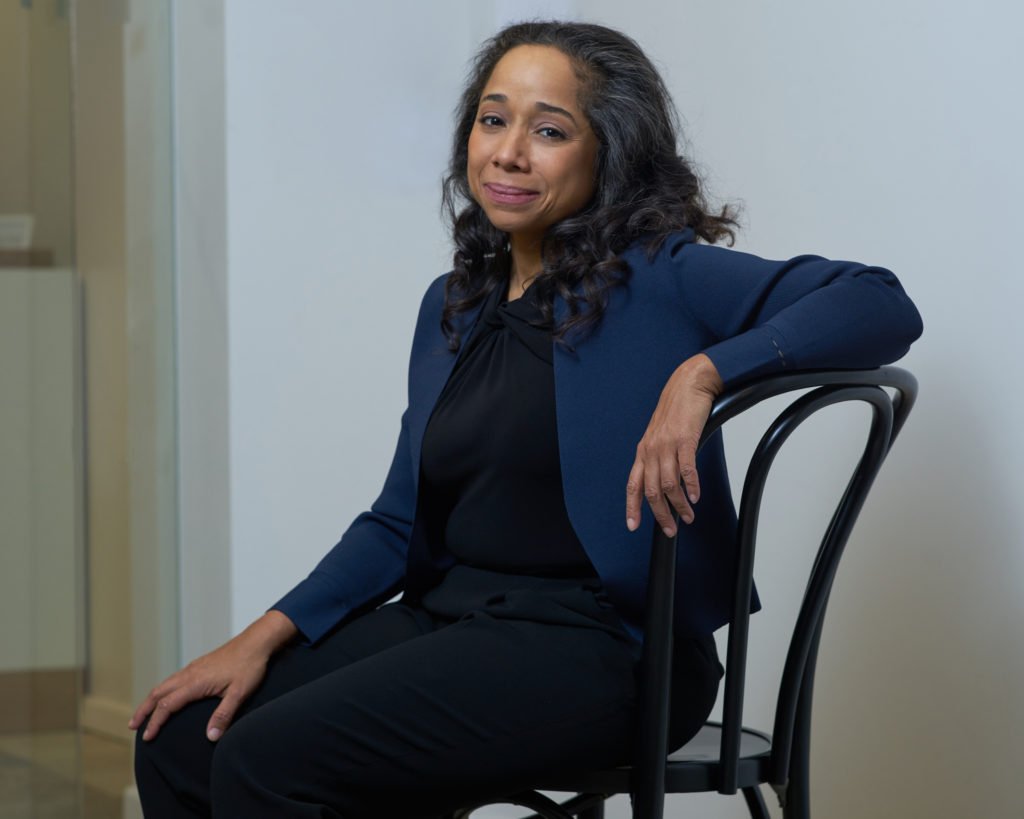
Julissa wears the Walters top in black, the Sant Ambroeus jardigan in galaxy blue, and the Howland trouser in black.
BEING AN AMBASSADOR CAN BE SCARY, and lonely, too. You are the senior person in a foreign country representing the United States, and I was always aware of how big of a deal that is. That sense of power gives you adrenaline, which makes it easier to be “on,” to work hard, and be effective. You know you’re there for reasons bigger than yourself. It’s a rush.
HOW DO I KEEP FROM GETTING OVERWHELMED? I love sleeping. I also have a good team of people to help me. I delegate. You can’t do anything, in policy or law, on your own. I also have a great support system of friends and family, who help me manage my personal life and relax. They come to my home and we cook, dance, eat—there’s a lot of activity in my house. I enjoy quiet time too—but I mostly get that in my office.
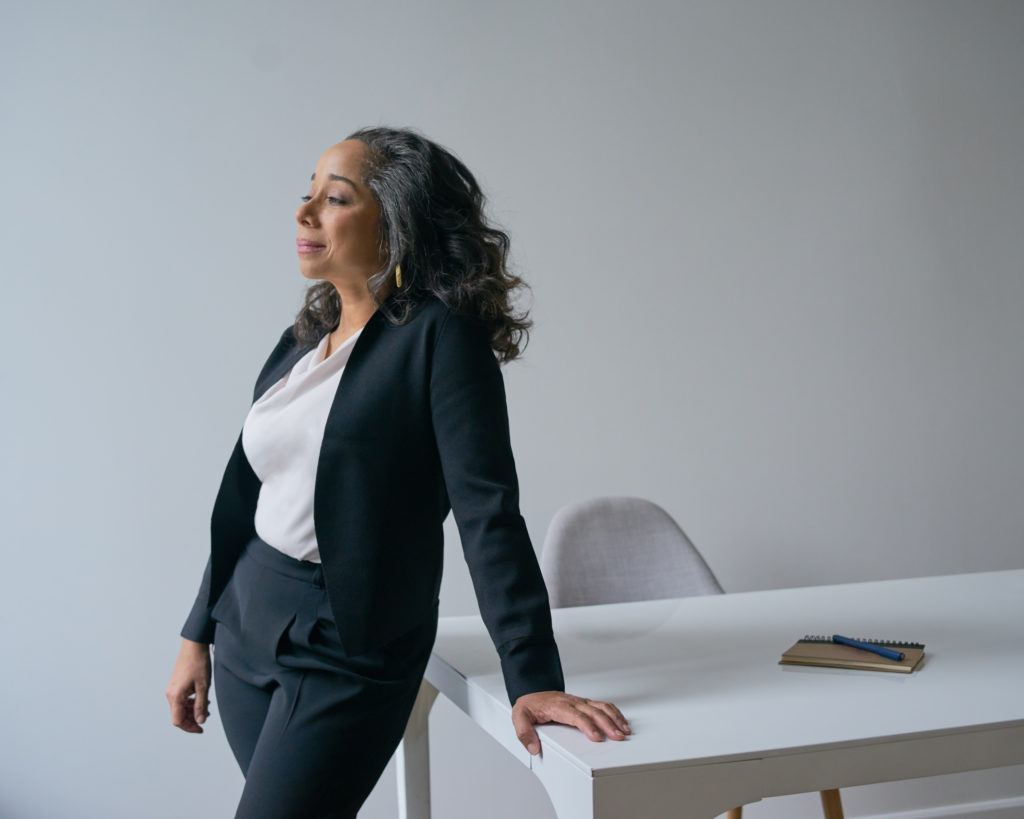
Julissa wears the Rowling top in birch, the Sant Ambroeus jardigan in black, the Howland trouser in black, and the Telesto earrings.
I HAVE A VERY ACTIVE LIFE IN NEW YORK. My schedule during the morning and daytime is pretty consistent, but the evenings vary. I have a young son, almost two years old, and he gets me up every morning. While he’s having breakfast, I make my list of things to accomplish for the day, and do a kind of meditation—some deep thinking. It’s a really nice routine, actually, almost like a ceremony. I put my son to bed most nights, although sometimes I go out to a dinner or an event, and I teach a class at Columbia one night a week.
I WISH I HAD MORE TIME TO THINK ABOUT GETTING DRESSED. I want to look serious but funky. I’m short, and I usually wear pants. I tend to wear dark colors and add originality with my accessories. I like long earrings with a classic black outfit. I also wear a lot of cowboy boots and hats. I collect hats, especially sombreros. That’s my thing. I’m wouldn’t say I’m predictable, but there’s a pattern to my dress code.
I’VE ALWAYS LOOKED DIFFERENT from most people in the places I’ve been as an adult. There came a point where I stopped trying to blend in—why bother? I’m different. And so it doesn’t matter what I wear. I might as well have fun.
Photographs by Chad Davis.





